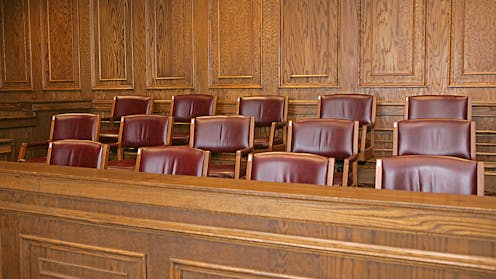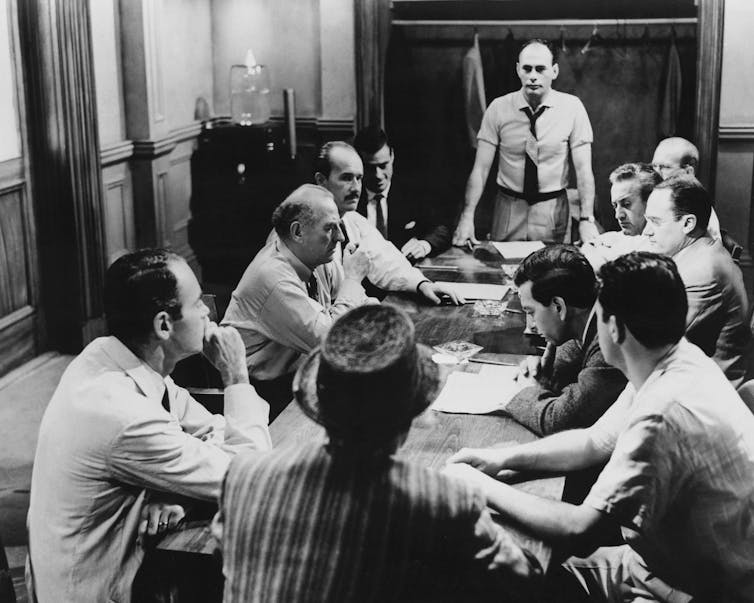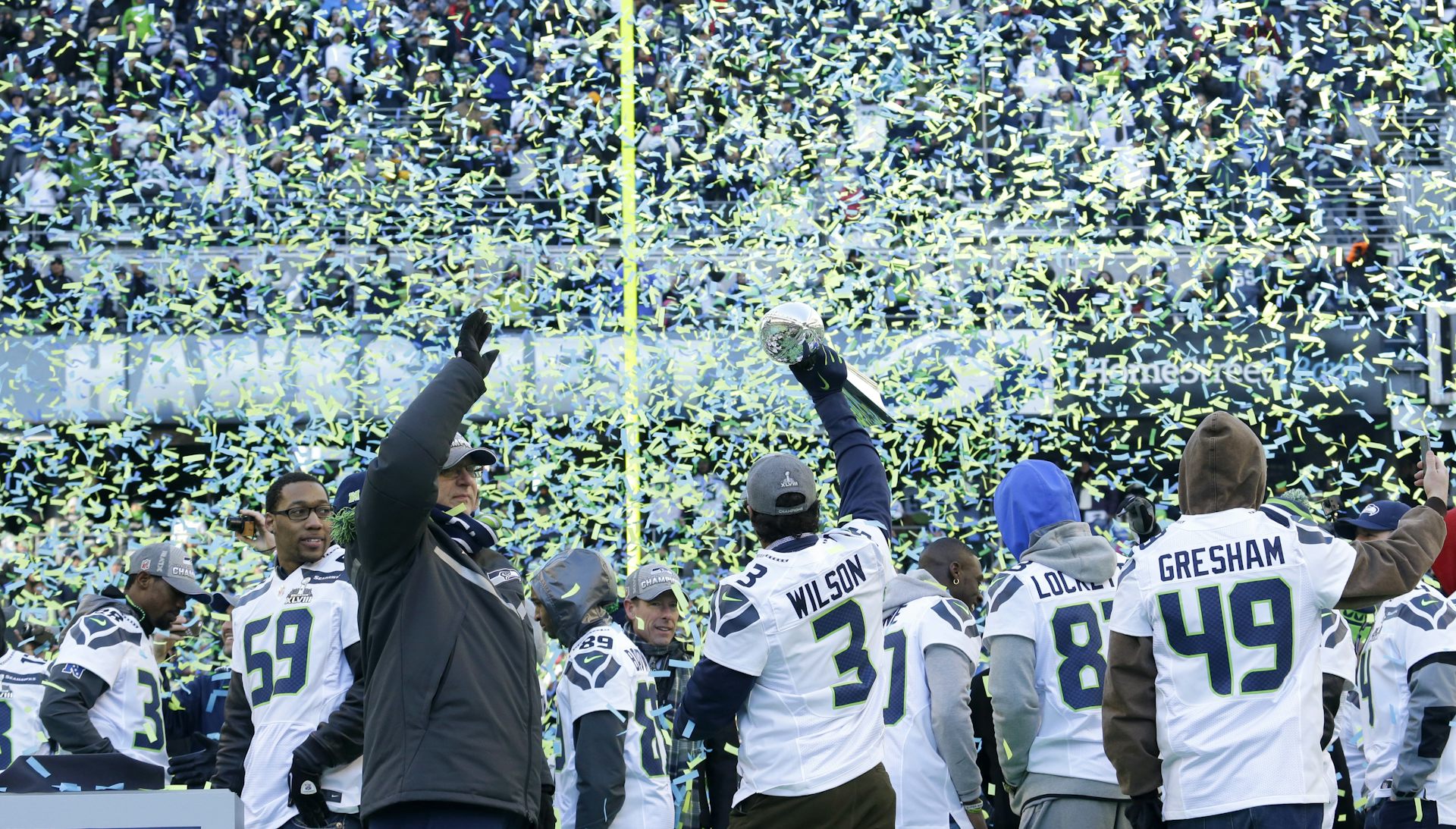Jury trials, a critical part of democracy, are disappearing
Juries now decide only a tiny share of civil and criminal trials in the US – and that hurts democracy.

The right to trial by jury in criminal and civil cases is enshrined in the U.S. Constitution. It’s also a critically important way in which citizens can participate in democracy.
The French thinker Alexis de Tocqueville observed early American juries at work. He noted in “Democracy in America” in 1831 that trial by jury “places the real direction of society in the hands of the governed, or of a portion of the governed, instead of leaving it under the authority of the Government.”
Yet, in a change with profound implications, juries now decide only a tiny fraction of criminal and civil cases in the U.S. The decline over time has been dramatic, triggering warnings from scholars since at least the 1920s. In 1962, when federal judicial statistics became reliable enough to track the trend, juries decided about 6% of civil cases; today that share is less then 1%.
In a recent article we wrote with our colleague Robert Peck, we described how in the 1960s a federal judge would typically preside each year over 10 or more civil jury trials – legal disputes between private parties. In 2024, the average federal judge heard only one or two civil jury trials per year.
Criminal cases, in which a defendant is accused of a crime, show a similar pattern. The average federal judge presided over roughly two jury trials in 2024.
In state courts, jury trials have likewise declined over the past decade. In most states, juries now decide just 1% to 2% of criminal and civil cases that come before the courts.
We study how juries work in practice and the jury’s institutional role in the constitutional structure. Both of us have observed how legal and policy shifts in the United States have limited the role juries, and thus citizens, play as a vital democratic check on government power.
Trials make disputes public, and jury trials allow citizens to debate the issues and return verdicts that reflect their community. That visibility and participation make the legal system more accountable and legitimate.
Replacing juries
The U.S. Founding Fathers’ long list of grievances against King George III in the Declaration of Independence included “depriving us in many cases, of the benefits of Trial by Jury.” In drafting the U.S. Constitution, they embedded juries throughout the new federal framework, for both civil and criminal cases. State constitutions likewise entrenched robust jury rights.
Early Americans thus saw jury service not merely as a procedural safeguard against overreaching government authority, but as a way to distribute the power granted by the Constitution, ensuring that ordinary citizens played an important role.

But over time, state and private actors have chipped away at that authority.
In criminal cases, the main mechanism that has diminished juries’ influence has been private bargains between prosecutors and defendants. Guilty pleas now resolve more than 90% of criminal cases nationwide, according to a 2023 American Bar Association report.
In “Punishment without Trial: Why Plea Bargaining is a Bad Deal,” legal scholar Carissa Byrne Hessick describes how defendants are pressured to plead guilty by the all-too-real threat of longer sentences if they exercise their right to a jury trial rather than accepting an offer from prosecutors. This so-called “trial penalty” has produced what some scholars refer to as an innocence problem, in which even factually innocent people rationally plead guilty.
Efficiency has a role in clearing crowded court dockets. But when almost all cases end in pleas, the legal system loses transparency and public checks on police and prosecutors’ work.
The same trend emerges in civil cases. Mandatory arbitration in consumer and employment contracts, along with legislatively imposed limits on the size of damage awards, have displaced jury determinations of liability and awards.
Procedural shifts since the 1980s also steer cases away from juries at the start. Federal and state rules of procedure are structured so that a civil jury trial is waived by default and must be affirmatively demanded.
The rise of what legal scholar Judith Resnik called “managerial judging,” where judges take a more activist role in supervising cases, channels cases toward private settlements where details are not divulged, even for those who prefer public resolution. Certain expanded pretrial procedures have also given judges the power to displace juries and terminate cases in light of their own “judicial experience and common sense,” as the U.S. Supreme Court put it in a 2008 opinion.
Although many of these changes were done in the name of efficiency, legal scholar Suja Thomas argues in her book “The Missing American Jury” that they also benefit political and economic elites by wresting away some of the power that formerly belonged to juries. The cumulative effect is fewer community judgments and more private, judicial and legislative control over outcomes.
How juries support democracy
In our view, restoring the jury to its original place within the constitutional structure would help revitalize the justice system’s democratic character.
As legal scholar Alexandra Lahav argues in her book “In Praise of Litigation,” trials make disputes public. Jurors hear evidence in open court, deliberate with other citizens about the issues and return verdicts that reflect community standards, in ways that backroom deals and private arbitration cannot.
Jury service also widens the circle of people invested in courts that work and that operate honestly. Although many people are initially dismayed when they are summoned to jury duty, most jurors become more favorable toward the courts once they serve.
These effects can reach beyond the courthouse. Some legal experts assert that restoring the jury could also spark broader democratic renewal at a time when civil society in the U.S. is under enormous strain.
This was evident in a set of studies by political scientist John Gastil and his colleagues that explored the connection between jury service and other forms of civic engagement. Examining jurors’ voting history before and after the period of jury service in seven states, they discovered that jury participation increased the likelihood of voting.
The presence of citizen participation in legal decision-making encourages civic engagement, fosters public trust and reanimates the participatory ideals on which the American republic was founded. John Adams put it well in 1774, when the British Parliament placed the judicial system of Massachusetts under royal control.
“Representative government and trial by jury are the heart and lungs of liberty,” Adams argued. “Without them we have no other fortification against being ridden like horses, fleeced like sheep, worked like cattle, and fed and clothed like swine and hounds.”
Valerie P. Hans is a member of the Board of Advisors of the Civil Justice Research Initiative. Her research on juries has been funded by the National Science Foundation, National Institute of Justice, State Justice Institute, and Cornell University.
Richard Lorren Jolly is a senior fellow with the Civil Justice Research Initiative.
Read These Next
Cuba’s speedboat shootout recalls long history of exile groups engaged in covert ops aimed at regime
From the 1960s onward, dissident Cubans in exile have sought to undermine the government in Havana −…
Drug company ads are easy to blame for misleading patients and raising costs, but research shows the
Officials and policymakers say direct-to-consumer drug advertising encourages patients to seek treatments…
Tiny recording backpacks reveal bats’ surprising hunting strategy
By listening in on their nightly hunts, scientists discovered that small, fringe-lipped bats are unexpectedly…





